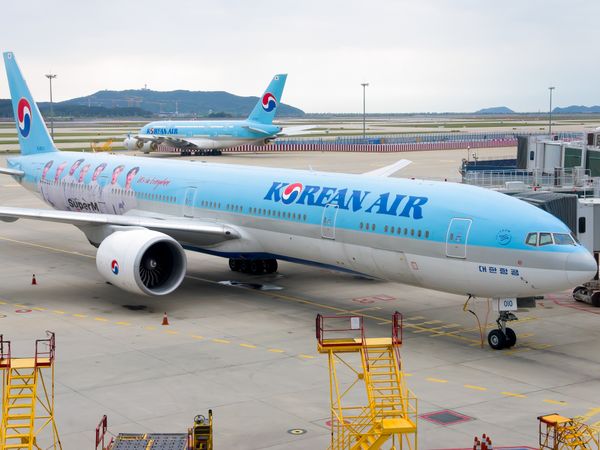Korean Air will request passengers to weigh themselves at the airport before boarding their flight. However, the airline's goal is not to engage in body shaming or other forms of discrimination against passengers because of their weight. Instead, Korean Air plans to "[measure] the average weight of passengers along with their carry-on items for flight safety."
Korean Air announced that the program will affect some passengers departing from its hubs at Gimpo International Airport (GMP) and Incheon International Airport (ICN) in Seoul. The program will run from August 28 to September 3 at Gimpo and from September 8 to 19 at Incheon. Korean Air plans to anonymously weigh passengers and their luggage and share the data with South Korea's Ministry of Land, Infrastructure, and Transport.

Not all passengers must weigh themselves if they feel uncomfortable sharing their weight; Korean Air will allow passengers to opt out of the process. The airline would have to make such a program optional to avoid accusations of discrimination against its passengers. Although Korean Air does not officially have a diversity, equity, and inclusion (DEI) policy, many other airlines have policies that prohibit discrimination based on characteristics such as weight.
South Korea's civil aviation authority, the Korea Office of Civil Aviation (KOCA), requires Korean Air to occasionally collect data on the weight distribution of its flights. It is currently unknown if KOCA will require other Korean airlines, such as Asiana Airlines, to obtain passenger weight data.

Korean Air will use the data to help determine the optimal weight distribution of its aircraft. Data collection only has to happen once every five years. An aircraft's weight is important because it affects fuel consumption and the distances it can fly. The airline aims to find more efficient ways to distribute weight on an aircraft.
Representatives from Korean Air spoke to various news sources to clarify the airline's decision.

One spokesperson told The Independent: "Korea's Ministry of Land, Infrastructure, and Transportation has advised all Korean flag carriers to weigh passengers with their carry-on baggage to update its 'Aircraft Weight and Balance Management Standards.' This is crucial for the safety of flight operations, and Korean Air complies with this mandate and remains committed to safety, its number one priority."
Meanwhile, another Korean Air representative told Korea JoongAng Daily: "Korean Air passengers will be asked to step on scales with their carried-on items at each boarding gate. The data collated anonymously will be utilized for survey purposes and doesn't mean overweight passengers will need to pay more."

According to Korean Air's website, passengers in economy class can have one carry-on bag and one personal item if the total weight is less than 10 kg (22 lb). Passengers in premium cabins can have two carry-on bags of no more than 18 kg (40 lb). The study will not involve passengers checked bags.
Korean Air is one of two airlines to weigh passengers in recent months. Air New Zealand announced plans to collect passenger weight on international flights departing from Auckland Airport (AKL) in May. The airline did the study for similar reasons to Korean Air. Weighing passengers is relatively uncommon among major airlines, and it remains to be seen if other carriers will engage in similar initiatives.
Airbus Helicopters Reports 20% Order Jump as Global Defence Demand Peaks » Amazon Prime Air Airbus A330 Emergency Landing in Cincinnati After Bird Strike Triggers Engine Fire » Trump to Decertify Bombardier Global Express Over Gulfstream Dispute »
Comments (0)
Add Your Comment
SHARE
TAGS
NEWS Korean Air Korea Flight Travel Seoul Gimpo Incheon ICN GMPRECENTLY PUBLISHED
 This Week in Aviation: The 10 Stories That Mattered Most
From major airline developments to aircraft updates and industry shifts, this weekly recap highlights the ten most-read aviation stories from the week of January 25.
INFORMATIONAL
READ MORE »
This Week in Aviation: The 10 Stories That Mattered Most
From major airline developments to aircraft updates and industry shifts, this weekly recap highlights the ten most-read aviation stories from the week of January 25.
INFORMATIONAL
READ MORE »
 Probe Into Catastrophic Air India Flight 171 Crash Leans Toward Deliberate Pilot Action Despite New Whistleblower Claims
In a significant and controversial shift for the global aviation community, investigators probing the June 2025 crash of Air India Flight AI171 are now focusing on deliberate pilot intervention as the primary cause of the disaster.
STORIES
READ MORE »
Probe Into Catastrophic Air India Flight 171 Crash Leans Toward Deliberate Pilot Action Despite New Whistleblower Claims
In a significant and controversial shift for the global aviation community, investigators probing the June 2025 crash of Air India Flight AI171 are now focusing on deliberate pilot intervention as the primary cause of the disaster.
STORIES
READ MORE »
 "Cancel Takeoff Clearance" Southwest Pilots Abort High Speed Takeoff to Avoid San Antonio Runway Collision
Federal authorities have launched a high-priority investigation into a "severe" runway incursion at San Antonio International Airport (SAT) that occurred on the afternoon of January 27, 2026. A Southwest Airlines Boeing 737 MAX 8 (B38M) was forced to perform an emergency high-speed rejected takeoff after a private turboprop mistakenly crossed into its path.
STORIES
READ MORE »
"Cancel Takeoff Clearance" Southwest Pilots Abort High Speed Takeoff to Avoid San Antonio Runway Collision
Federal authorities have launched a high-priority investigation into a "severe" runway incursion at San Antonio International Airport (SAT) that occurred on the afternoon of January 27, 2026. A Southwest Airlines Boeing 737 MAX 8 (B38M) was forced to perform an emergency high-speed rejected takeoff after a private turboprop mistakenly crossed into its path.
STORIES
READ MORE »



